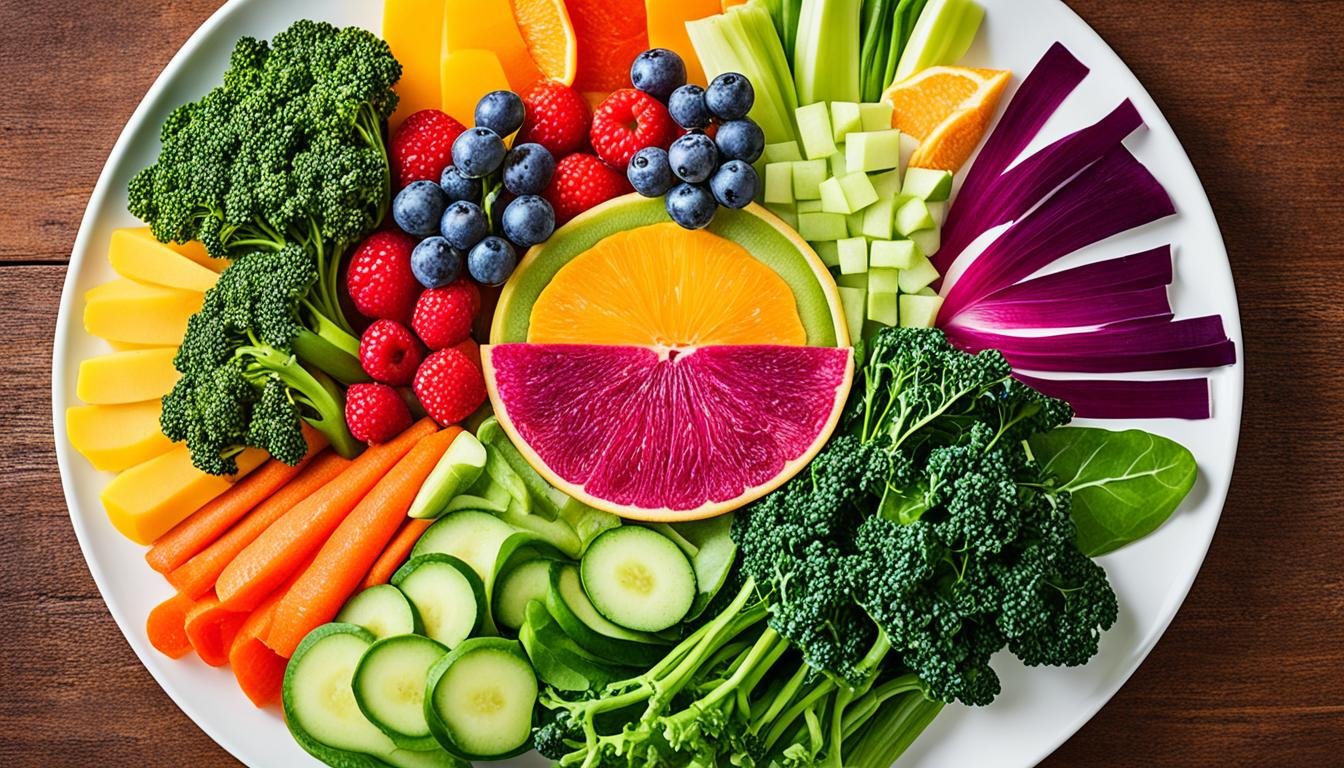Embracing a plant-based diet can have a significant impact on both health and sustainability. By incorporating more vegetarian cooking into your meals, you can enjoy a range of benefits that not only support your well-being but also contribute to a more environmentally friendly world.
When you think of vegetarian cooking, you might imagine a wide variety of plant-based recipes, meatless meals, and vegan cuisine that can delight your taste buds and nourish your body. From vegetable-forward dishes to veggie-centric menus, the world of herbivore culinary offers endless possibilities for creating delicious and nutritious meals.
But vegetarian cooking goes beyond simply replacing meat with vegetables. It involves a shift toward a meat-free cooking approach, where the focus is on whole foods derived from plant sources. By embracing a vegetarian diet, you open the door to a veggie-lover’s kitchen, where you can explore different flavors, textures, and cooking techniques.
Not only does vegetarian cooking offer a variety of culinary exploration, but it also has numerous health benefits. Research has shown that a vegetarian diet can help reduce body weight, lower blood pressure, and decrease the risk of heart disease, cancer, and diabetes. By choosing plant-based recipes and meals, you can support your overall well-being and improve your quality of life.
Furthermore, vegetarian cooking aligns with sustainability principles. Livestock production contributes significantly to greenhouse gas emissions, deforestation, and water pollution. By reducing or eliminating animal-based food consumption, you can play your part in reducing the ecological impact on the planet.
Whether you are committed to a vegetarian lifestyle or simply looking to incorporate more vegetarian cooking into your meals, the benefits are undeniable. So, step into the world of vegetarian cuisine and savor the flavors while making a positive impact on your health and the planet.
Key Takeaways:
- Embracing a plant-based diet can have significant health benefits.
- Vegetarian cooking reduces the risk of chronic diseases such as heart disease and diabetes.
- Choosing vegetarian recipes and meals supports sustainability by reducing greenhouse gas emissions.
- Exploring vegetarian cuisine allows for culinary creativity and variety.
- Transitioning to a vegetarian diet can promote a more ethical and compassionate approach to food.
The Health Benefits of Vegetarian Cooking
A vegetarian diet offers a wide range of health benefits, making it an excellent choice for those looking to improve their overall well-being. By focusing on plant-based foods, individuals following a vegetarian diet can reap the rewards of a nutrient-rich and balanced eating plan.
Lower Risk of Chronic Diseases
Studies have consistently shown that individuals who embrace a vegetarian diet have a lower risk of developing chronic diseases such as heart disease, high blood pressure, type 2 diabetes, and certain cancers. Plant-based diets are naturally lower in saturated fat and cholesterol, which are commonly associated with these health conditions. Instead, vegetarian diets are high in fiber, vitamins, minerals, and phytochemicals, all of which contribute to improved heart health, weight management, and reduced risk of chronic illnesses.
Heart Health and Weight Management
One of the key benefits of a vegetarian diet is its positive impact on heart health. Plant-based foods are naturally low in saturated fat and cholesterol, two primary contributors to heart disease. By eliminating or reducing the consumption of animal products, individuals can maintain healthier cholesterol levels and support a healthy heart.
A vegetarian diet also promotes weight management. Whole grains, legumes, fruits, and vegetables are all nutrient-dense and low in calories, making them ideal for maintaining a healthy weight. The high fiber content of these plant-based foods helps individuals feel fuller for longer, preventing excessive calorie consumption and supporting weight loss goals.
Improved Digestive Health
Vegetarian diets are rich in fiber, which plays a crucial role in maintaining a healthy digestive system. Fiber helps to regulate bowel movements, prevent constipation, and promote the growth of beneficial bacteria in the gut. By including a variety of plant-based foods in their diet, individuals can improve their digestive health and experience fewer digestive issues.
Boosted Immune Function
The wide array of vitamins, minerals, and antioxidants found in plant-based foods can strengthen the immune system and enhance overall immunity. Vegetarian diets are abundant in vitamin C, vitamin E, beta-carotene, and other essential nutrients that support immune function. By consuming these nutrient-dense foods, individuals can give their bodies the tools they need to fight off infections and maintain optimal health.
In summary, adopting a vegetarian diet can provide numerous health benefits, including a reduced risk of chronic diseases, improved heart health, weight management, better digestive health, and boosted immune function. By embracing vegetarian cooking and incorporating a variety of nutrient-rich plant-based foods into their diets, individuals can enjoy a healthier and more vibrant life.
The Environmental Impact of Vegetarian Cooking
Choosing a vegetarian lifestyle has a positive impact on the environment. By reducing or eliminating animal-based food consumption, we can significantly contribute to the reduction of greenhouse gas emissions, deforestation, and water pollution. Embracing vegetarian cooking not only benefits our health but also supports the preservation of precious land and water resources. Let’s explore the environmental advantages of embracing a vegetarian lifestyle:
Reducing Greenhouse Gas Emissions
Livestock production is a major contributor to greenhouse gas emissions, particularly methane and nitrous oxide. The production and transportation of animal-based products release significant amounts of these gases into the atmosphere, contributing to climate change. By adopting a vegetarian diet, we can effectively reduce our carbon footprint and help mitigate the environmental impact caused by the meat industry.
Preserving Land and Water Resources
The meat industry requires vast amounts of land for animal grazing and feed production. This leads to deforestation and habitat destruction, endangering countless species and compromising biodiversity. Additionally, livestock farming consumes substantial amounts of water, contributing to water scarcity and pollution. By embracing vegetarian cooking, we actively support the preservation of land and water resources, helping to maintain ecological balance and protect fragile ecosystems.
“The environmental impact of our food choices extends beyond our plates. By choosing vegetarian cooking, we can play a crucial role in conserving the Earth’s natural resources.”
In addition to reducing greenhouse gas emissions and preserving land and water resources, a vegetarian lifestyle also supports biodiversity preservation. The meat industry is a significant contributor to habitat loss and species extinction, as forests are cleared to make way for pastures and feed crops. Choosing plant-based alternatives helps safeguard the diversity of life on our planet.
By embracing vegetarian cooking and making conscious dietary choices, we can become stewards of the environment and promote sustainable practices. Let’s prioritize the well-being of our planet while enjoying the many delicious and nutritious vegetarian meals available to us.

Benefits of Vegetarian Cooking for the Planet:
- Reduces greenhouse gas emissions
- Preserves land and water resources
- Safeguards biodiversity
Considerations for Vegetarian Cooking
When transitioning to a vegetarian diet, it’s essential to take into account nutritional considerations to ensure a well-balanced and fulfilling menu. By incorporating plant-based proteins, meal planning, and culinary exploration, you can create nourishing and delicious vegetarian meals.
Meeting Nutritional Needs
A well-planned vegetarian diet can provide all the necessary nutrients for optimal health. Key nutrients to focus on include protein, iron, calcium, and omega-3 fatty acids. While many people associate these nutrients with meat, there are plenty of plant-based alternatives that can adequately replace them.
Plant-based proteins are abundant in legumes such as lentils, chickpeas, and black beans, which not only provide protein but also offer a good source of fiber. Other excellent sources of plant-based proteins include tofu, tempeh, and quinoa. These versatile ingredients can be incorporated into a variety of dishes, from stir-fries to salads and burgers.
“A well-planned vegetarian diet can provide all the necessary nutrients for optimal health.”
In addition to protein, it’s crucial to consider sources of iron and calcium. Leafy greens like spinach and kale, as well as fortified plant-based milks, can provide adequate amounts of these essential minerals.
Omega-3 fatty acids, often associated with fish, can be obtained from plant-based sources such as flaxseeds, chia seeds, and walnuts. Incorporating these foods into your diet can support brain health and reduce the risk of chronic diseases.
Meal Planning and Culinary Exploration
Meal planning is a valuable tool for ensuring that you meet your nutritional needs while enjoying a diverse and exciting vegetarian menu. By dedicating time to plan your meals in advance, you can ensure that you include a variety of plant-based ingredients that provide essential nutrients.
Consider creating a weekly meal plan that incorporates a mix of cuisines and flavors. This approach not only keeps your meals interesting but also allows you to experiment with different cooking techniques and flavor profiles. Exploring cuisines known for their plant-forward dishes, such as Mediterranean, Indian, or Thai, can provide inspiration and expand your culinary horizons.

Sample Vegetarian Meal Plan
| Meal | Day 1 | Day 2 | Day 3 |
|---|---|---|---|
| Breakfast | Avocado toast with cherry tomatoes | Berry smoothie bowl topped with nuts and seeds | Oatmeal with sliced banana and almond butter |
| Lunch | Mediterranean quinoa salad | Veggie wrap with hummus | Black bean burrito bowl |
| Dinner | Chickpea curry with brown rice | Stir-fried tofu with vegetables | Vegetable lasagna |
| Snack | Carrot sticks with hummus | Trail mix with dried fruit and nuts | Apple slices with almond butter |
Remember that meal planning is a flexible tool, and you can adjust it to suit your preferences and dietary needs. Feel free to incorporate your favorite vegetarian recipes, snacks, and desserts into the plan.
By considering nutritional needs, incorporating plant-based proteins, engaging in meal planning, and exploring a variety of vegetarian recipes, you can enjoy a diverse and satisfying vegetarian diet that supports your overall health and well-being.
Conclusion
Embracing a vegetarian lifestyle offers a plethora of benefits for both personal well-being and the planet. By choosing to nourish our bodies with plant-based foods, we can improve our health, reduce our environmental impact, and take a compassionate stance toward animal welfare.
From the wide variety of delicious and nutritious vegetarian recipes available, transitioning to a vegetarian diet has never been easier. With a little culinary exploration, you can embark on a flavorful journey of discovering the vibrant world of vegetarian cuisine.
By adopting a vegetarian lifestyle, we not only support our own health but also contribute to a more sustainable and ethical world. As we savor the delights of vegetarian cooking, we decrease our ecological footprint, reduce greenhouse gas emissions, and help preserve land and water resources. Join the vegetarian movement today and positively impact both your health and the planet through the joy of vegetarian culinary exploration.


